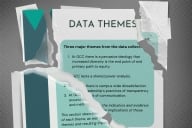You have /5 articles left.
Sign up for a free account or log in.

iStock
A new analysis finds that students enrolling in certificate programs are more likely to experience economic gains from enrolling in programs at public institutions, generally community colleges, than at for-profit institutions. Further, the analysis finds that people may be better off economically by not pursuing any postsecondary education than by enrolling in a certificate program at a for-profit.
The analysis comes amid significant debates over vocationally oriented higher education. While the Obama administration pushed for tougher regulation of for-profit higher education, the Trump administration is revising and/or delaying measures that have been opposed by for-profit higher education.
President Trump, meanwhile, this month criticized the vocational education programs of community colleges as inadequate -- much to the frustration of community college leaders who said they are running programs that do exactly what the president suggested they were not.
The new analysis is forthcoming in The Journal of Human Resources, by Stephanie Riegg Cellini, associate professor of public policy and public administration at George Washington University, and Nicholas Turner, a senior economist at the Federal Reserve Board of Governors. The Brookings Institution published a paper by Cellini summarizing the findings.
Their analysis was based on Department of Education data for gainful-employment regulations (seeking to determine if people who finish programs are earning enough to repay their debts) and tax records from the Internal Revenue Service. The data covered 14 years of earnings history for more than 800,000 students in programs eligible for federal aid. The pool was large enough to compare earnings impact on students with comparable backgrounds and in comparable educational programs. For example, the researchers were able to drill down so comparisons were, for example, of women in their 30s who earned health-professions certificates in the Washington area.
The key findings:
- For-profit-college students are 1.5 percentage points less likely than those enrolled at public institutions to be employed after leaving their program.
- If the students at for-profit institutions do find work, their earnings are about 11 percent (or $2,100 per year) lower than those of students at public institutions.
- The income gap is just part of the picture. Students at for-profit institutions borrow, on average, $5,000 more than their counterparts who enroll at public institutions. As a result, their economic situation is significantly worse than those who attend public institutions.
- The above patterns are consistent in every state in the country, which the authors suggest is significant, given different economic conditions and levels of state regulation of for-profit higher education in different states.
- With regard to programs, of the 20 most popular certificates for for-profit-college students, the income gains were greater at public institutions for 16 of them. In the four programs where there were greater gains for for-profit-college students, those gains were at most $558, and that was offset multiple times by greater debt levels for such students.
One argument used by advocates for for-profit higher education is to note that many community colleges have more demand for certain programs than they can meet. "What if attending a public community college is not an option?" ask the authors.
"We investigate this question by matching for-profit students to similar individuals with no college education. We find that the earnings gains to attendance cannot be shown to be different from zero and are, at most, about $365 per year. Comparing these best-case average earnings gains to average debt in a back-of-the-envelope calculation suggests that -- even in the best case -- the increased earnings of for-profit certificate students are not enough to offset their debt and interest payments, leaving the average student with a net loss of about $1,200 over her lifetime," the paper says.
The Brookings paper ends by questioning the direction of Education Secretary Betsy DeVos on for-profit higher education. The findings "suggest that the Department of Education’s recent proposals to weaken accountability under gainful employment are misguided," the paper says. "Rather than removing sanctions for institutions whose graduates have high debt and low earnings -- as the DeVos administration proposes -- our results support calls for stronger accountability measures to ensure that for-profit students generate sufficient earnings to cover the high cost of their education."
A spokesman for Career Education Colleges and Universities, which represents for-profit institutions, did not respond to voice mail or email requests for comment on the study.
David Baime, senior vice president for government relations and policy analysis at the American Association of Community Colleges, offered this statement via email: "The study reinforces the growing body of evidence showing that community college workforce outcomes compare favorably to those of for-profit colleges. Last year's gainful employment data conveyed similar conclusions. Community colleges need to make sure that the public fully understands the economic payoffs of their programs."








